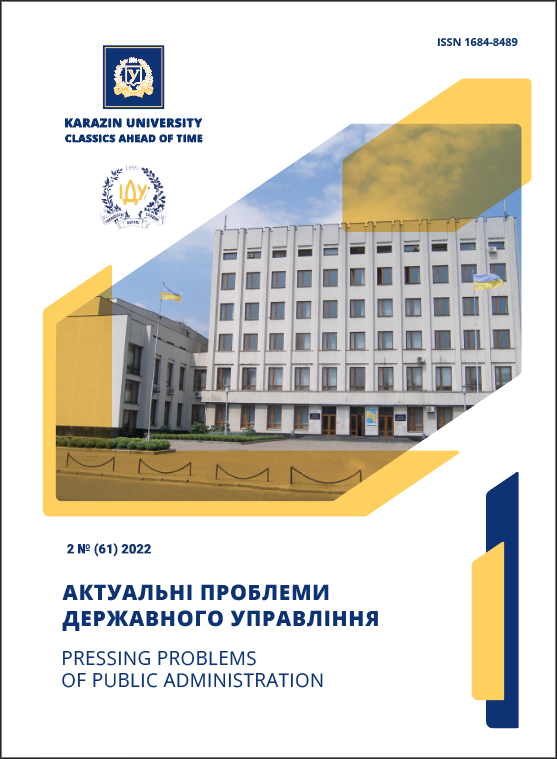Public administration using blockchain technology and platforms: new opportunities
Abstract
This article aims to identify potential applications of blockchain technology in public administration. Although blockchain is most useful when trust in government is low (because blockchain provides greater accountability), the feasibility of implementing blockchain solutions depends on a certain level of administrative and technical capacity of the authorities and, most importantly, on their readiness and willingness to implement these technologies. depends on the following factors. The reluctance to implement blockchain technology is partly related to the perception that blockchain is in “competition” with the state. There are also “usual” political barriers to change in administrative structures, such as the reluctance of government officials to introduce new technologies.
The analysis showed that blockchain technology has not yet become widespread in the public sector, although a number of pilot programs have been developed. In addition, many applications of blockchain have not progressed beyond proof of concept and pilot implementations on a limited scale, and further research is needed on the barriers to the adoption of blockchain technology in the public sector, including the issue of the so-called “digital divide”.
We know that the consideration of blockchain in public administration can be divided into one or more of the following perspectives: blockchain as a technology of freedom, blockchain as a polycentric structure, or blockchain as a new type of database. Each perspective sheds light on its potential for public sector governance, as blockchain can be all three, depending on the political, economic, social and technological context.
The article also identifies that personal data, government procurement, online government services and support for democratic processes are areas where blockchain technology can be successfully used to improve administrative efficiency. However, the analysis also proved that blockchain offers opportunities in almost all areas of public administration, so a special program for implementing blockchain technology in the public sector is needed.
Downloads
References
Allen, D.W.E., Berg, C., Davidson, S., MacDonald, T., and Potts, J. (2021). Building a Grammar of Blockchain Governance. Cryptoeconomics Australia. Retrieved from: https://medium.com/cryptoeconomics-australia/building-a-grammar-of-blockchain-governance-c2cb4b70f915.
Allen, D.W.E., Berg, C., and Lane, A.M. (2019). Cryptodemocracy: How Blockchain Can Radically Expand Democratic Choice. London: Rowman & Littlefield.
Alston, E., Law, W., Murtazashvili, I., and Weiss, M.B. (2021). Can Permissionless Blockchains Avoid Governance and the Law? Notre Dame Journal of Emergency Technology, 2, 1–32.
Alston, E., Law, W., Murtazashvili, I., and Weiss, M. (2022). Blockchain Networks as Constitutional and Competitive Polycentric Orders. Journal of Institutional Economics,1, 1–17. DOI: https://doi.org/10.1017/S174413742100093X
Atzori, M. (2015). Blockchain Technology and Decentralized Governance: Is the State Still Necessary? New York: Cambridge University Press.
Berg, C., Davidson, S., and Potts, J. (2019). Understanding the Blockchain Economy: An Introduction to Institutional Cryptoeconomics. Cheltenham, United Kingdom: Edward Elgar Publishing.
Boettke, P.J., Salter, A.W., and Smith, D.J. (2021). Money and the Rule of Law: Generality and Predictability in Monetary Institutions. New York: Cambridge University Press.
Cohney, S., Hoffman, D., Sklaroff, J., and Wishnick, D. (2019). Coin-Operated Capitalism. Columbia Law Review, 119, 591–676.
Davidson, S., De Filippi, P., and Potts, J. (2018). Blockchains and the Economic Institutions of Capitalism. Journal of Institutional Economics, 14, 639–658. DOI: https://doi.org/10.1017/s1744137417000200
De Filippi, P., and Loveluck, B. (2016). The Invisible Politics of Bitcoin: Governance Crisis of a Decentralized Infrastructure. Internet Policy Review, 5, 1–28. DOI: https://doi.org/10.14763/2016.3.427
De Filippi, P., Mannan, M., and Reijers, W. (2020). Blockchain as a Confidence Machine: The Problem of Trust & Challenges of Governance. Technology in Society, 62(6):101284. DOI: https://doi.org/10.1016/j.techsoc.2020.101284
De Filippi, P., Wray, C., and Sileno, G. (2021). Smart Contracts. Internet Policy Review, 10 (2). DOI: https://doi.org/10.14763/2021.2.1549
De Filippi, P., and Wright, A. (2018). Blockchain and the Law: The Rule of Code. Cambridge: Harvard University Press.
Juskalian, R. (2018). Inside the Jordan Refugee Camp that Runs on Blockchain. MIT Technological Review, 2, 56–69.
Kud, A.A. (2021). Decentralized information platforms in public governance: reconstruction of the modern democracy or comfort blinding? International journal of public administration. DOI: https://doi.org/10.1080/01900692.2021.1993905
Lemieux, V.L. (2019). Blockchain and Public Record Keeping: Of Temples, Prisons, and the (Re)Configuration of Power. Frontiers in Blockchain, 2. DOI: https://doi.org/10. 3389/fbloc.2019.00005
Parks, R.B., Baker, P.C., Kiser, L., Oakerson, R., Ostrom, E., Ostrom, V., et al. (1981). Consumers as Coproducers of Public Services: Some Economic and Institutional Considerations. Policy Study Journal, 9, 1001–1011. DOI: https://doi.org/10.1111/j.1541- 0072.1981.tb01208.x
Poblet, M., Allen, D.W.E., Konashevych, O., Lane, A.M., and Diaz Valdivia, C.A. (2020). From Athens to the Blockchain: Oracles for Digital Democracy. Fronters in Blockchain, 3. DOI: https://doi.org/10.3389/fbloc.2020.575662
Reinsberg, B. (2019). Blockchain Technology and the Governance of Foreign Aid. Journal of Institutional Economics, 5(3), 1–17. DOI: https://doi.org10.1017/s1744137418000462
Roth, A.E. (2007). Repugnance as a Constraint on Markets. Journal of Economic Perspectives, 21, 37–58. DOI: https://doi.org/10.1257/jep.21.3.37
Rozas, D., Tenorio-Fornés, A., Díaz-Molina, S., and Hassan, S. (2021). When Ostrom Meets Blockchain: Exploring the Potentials of Blockchain for Commons Governance. SAGE Open, 11, 1–14. DOI: https://doi.org/10.1177/21582440211002526
Rozas, D., Tenorio-Fornés, A., and Hassan, S. (2021). Analysis of the Potentials of Blockchain for the Governance of Global Digital Commons. Frontiers in Blockchain, vol. 4, is. 577680, 1–13. DOI: https://doi.org/10.3389/fbloc.2021.577680
Sullivan, C., Burger, E. (2017). E-Residency and Blockchain. Computer Law & Security Review, vol. 33, is. 4, 470–481. DOI: https://doi.org/10.1016/j.clsr.2017.03.016
Werbach, K., and Cornell, N. (2017). Contracts Ex Machina. Duke Law Journal, 67,
–382.
Werbach, K. (2018). The Blockchain and the New Architecture of Trust. Cambridge, Mass.: MIT Press.

